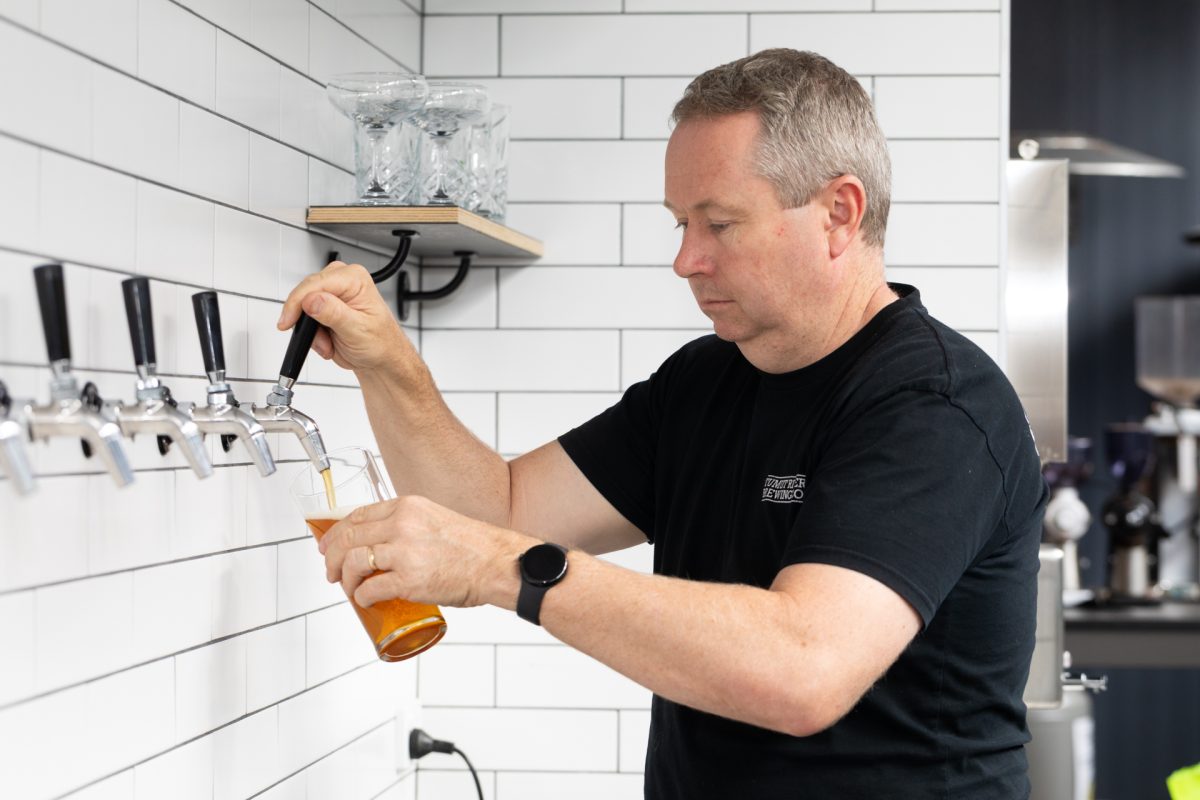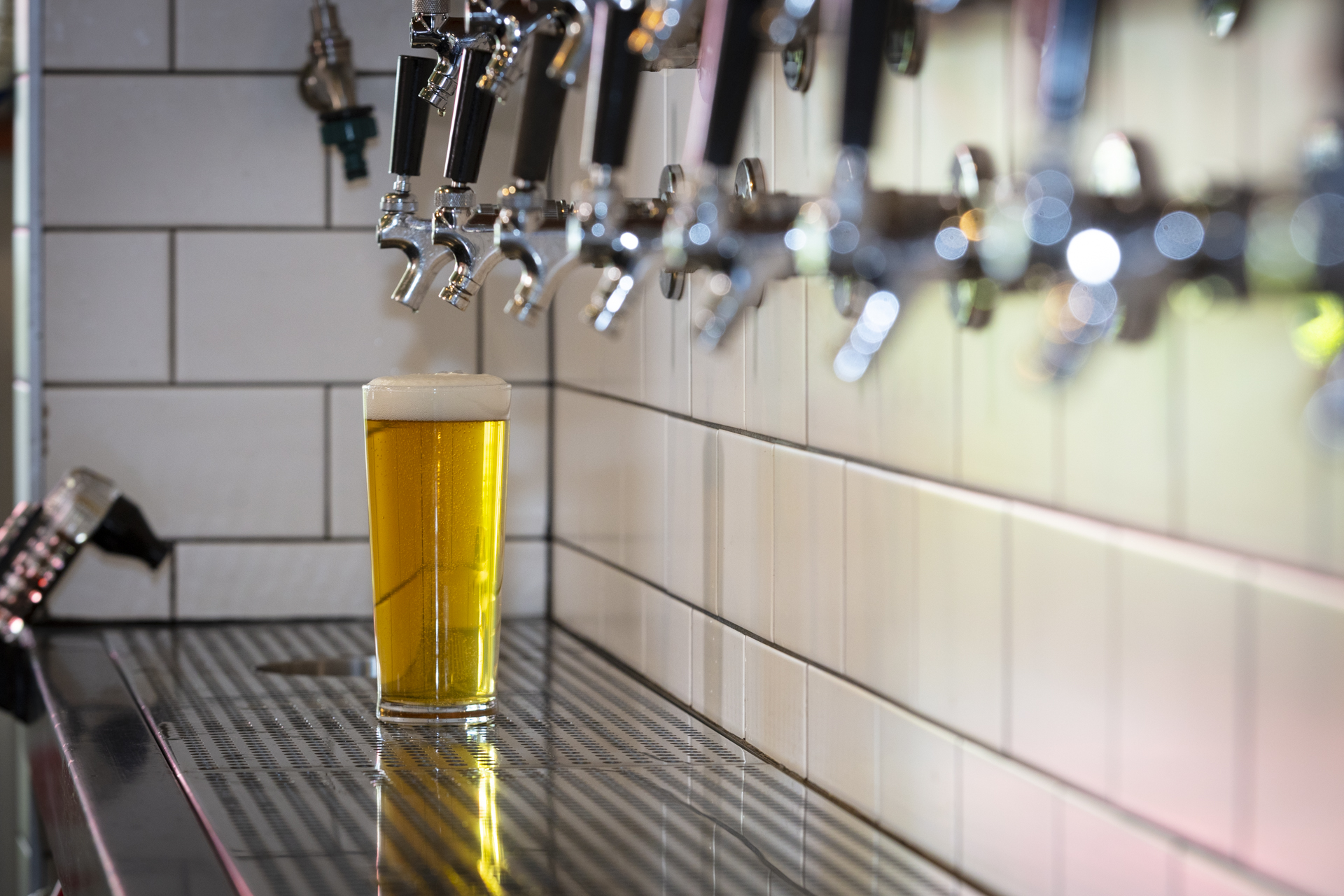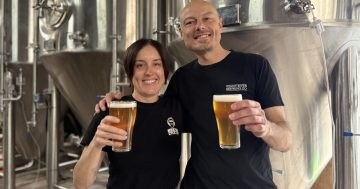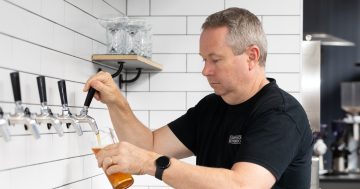
Tumut River Brewing Co. owner Tim Martin says many small breweries are struggling. Photo: Michelle Kroll.
Craft breweries and distilleries are once again calling for reforms to alcohol excise tax in the face of industry challenges and even public health risks as young people turn to other substances.
There have been many independent craft breweries and distilleries around Australia going into administration as the tax increases are heaped onto rising costs and lower consumer spending habits.
Tim Martin, who owns the Tumut River Brewing Co., which recently opened at the Causeway in Kingston, says that since lockdowns, habits have changed, and the cost of beer is just making things worse.
“Not only do we have a cost of living crisis, but we’ve also had real change in people’s behaviour. Since COVID, people have gotten out of the habit of going out and socialising with friends over a drink, and that kind of connection is something we need to be fostering,” he said.
The Canberra Distillery owner Tim Reardon told Region he is concerned to see more young people running towards drugs as a substitute for alcohol.
“This is a controversial opinion, but we’re at the point now where it’s cheaper to buy illicit drugs than it is to drink alcohol, so while we’re seeing a decrease in young people’s alcohol consumption, there’s the increased public health risk of illegal substances,” he said.
“If the reason we’re imposing a tax on alcohol is because of its adverse social impacts, then we need to create a market where legally sold products such as alcohol can compete with illegal substances.”
Data from the Australian Institute of Health and Welfare shows that 18 to 24-year-olds are the age group most likely to use illicit drugs.

Alcohol excise increases every six months. Photo: Thomas Lucraft.
Current legislation mandates a twice-yearly alcohol excise tax increase in line with the consumer price index (CPI). Supply chain disruptions during COVID have caused an unprecedented 20 per cent increase in excise tax over a short period of time, creating a very difficult environment for small businesses. There are also complicated rules with different taxes for different levels of ABV (alcohol by volume), and for beer, even the kind of container it is sold in affects the taxation rate.
“Most of our ingredients have doubled in price in the last couple of years. When we started out, the tax on a 5 per cent ABV beer was around $15 a box, and it’s now about $22, plus $7 in GST before you can even think about other costs,” Tim Martin said.
“Most of us are struggling pretty drastically as it is to keep businesses not even profitable but just viable!”
Industry experts argue that Australia’s brewing and distilling industries have the economic potential to grow into a billion-dollar export industry, but current policies are constraining growth and forcing many small brands out of the game altogether. One recent example is the historic brewery Billson’s, which went into administration in July, following the trend of craft drinks brands struggling to keep afloat.
Larger breweries are increasingly owned by international corporations that have focussed on automating their processes. Iconic Aussie beers like Great Northern, Fosters, Victorian Bitter, Melbourne Bitter, Reschs and Carlton Draught are all owned by Japanese company Asahi Breweries.
Tim Martin told Region that independent craft breweries make up 6 per cent of beer sales, but they employ 60 per cent of the people working in the industry, so making sure that locally owned small breweries stay viable is hugely important for employment and keeping industry profits in Australia.
Australian Distillers Association chief executive Paul McLeay told Region that high tax rates are preventing the Australian industry from growing.
The current tax rate for spirits is $103.89 per litre of alcohol, compared to $14 per litre of alcohol in America. The Australian rate works out at nearly $30 of tax in a bottle for a 700ml, 40 per cent abv bottle of gin. In 2019, it was less than $25.
“The problem we face is that with the tax so high it prevents small businesses from getting to scale. When you have a lower tax, you can reinvest in your business, but when 50 per cent of your final product price is going to tax … our hands are tied.”
Smaller breweries and distilleries are eligible for a tax rebate, but these rebates are having less of an impact, as Tim Martin explained: “The tax is going up every six months in line with inflation, but the rebate hasn’t grown, so it’s worth less and less to us every year.”
Industry advocates have long argued that increasing the rebate at the same rate as the tax would be an excellent (and relatively simple) way to help out small businesses.
The high tax rates are also impacting the sector’s ability to grow and export into overseas markets.
“Australian products are winning global awards and are sought after on the international stage. Twenty years ago, Sullivan’s Grove won best whisky, and there’s been a plethora of international accolades since then, but we can’t get products to the international market because the taxes are too high,” said Paul McLeay.
While beer and spirits makers are struggling with ever-increasing tax hikes, the wine industry has enjoyed the same flat rate for 20 years, just 29 per cent on the wholesale price. This means that cheap wines pay less tax, despite the fact that they could be argued to contribute to worse health and social outcomes.
Original Article published by Lucy Ridge on Riotact.










